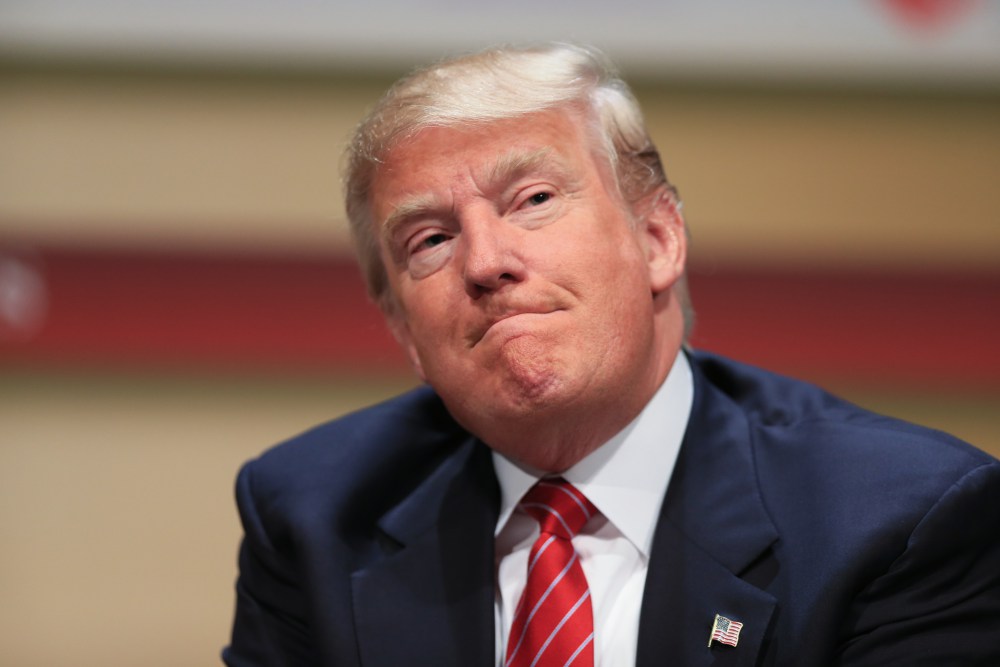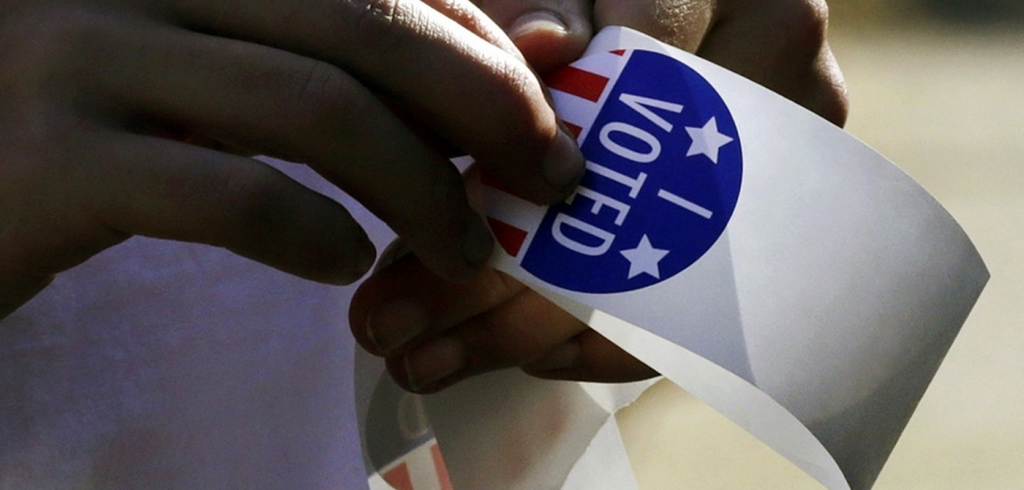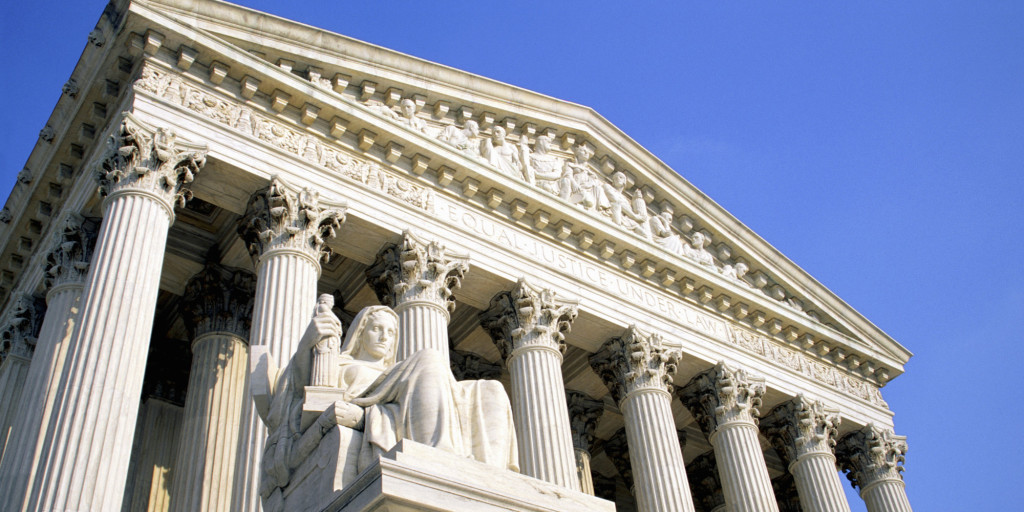GOP delegate math says Donald Trump nomination not yet inevitable

Despite Donald Trump‘s string of Super Tuesday victories, the billionaire businessman must do better in upcoming contests to claim the Republican presidential nomination before the party’s national convention this summer, an AP delegate count shows. Texas Sen. Ted Cruz is emerging as the candidate who could stop him – with a little help from Florida Sen. Marco Rubio. While Trump has racked up 10 wins through the first 15 contests, he’s won only 46 percent of the delegates that have been awarded since the voting began last month. It takes an outright majority of delegates to win the nomination. To win enough delegates to claim the nomination, Trump would have to win 52 percent of the remaining delegates – a difficult feat in a race with three or more candidates. That’s good news for Republican leaders in Washington and state houses across the country, who are deeply concerned about Trump’s electability, temperament and command of the issues. Texas Sen. John Cornyn said Wednesday morning that Trump’s remaining rivals – Cruz, Rubio, Ohio Gov. John Kasich and Ben Carson – are looking at their own chances and the possibility of a so-called brokered convention and “figure that they’ll hang in there as long as they can.” The possibility of a contested convention, which would come if no candidate claims a majority of delegates before the July convention, could wreak havoc on the GOP- particularly if Trump has an overwhelming delegate lead that’s just short of the needed majority. “If the establishment thinks there’s a backlash now, wait until the guy with the most delegates gets to the convention and they decide to take it from him,” said Republican operative Hogan Gidley. “Then you’re going to see an all-out political jihad.” Trump could take a major step forward in upcoming winner-take-all elections in the middle of the month, however, and all of his rivals are doing considerably worse than the New York real estate mogul. The Republican front-runner’s delegate gains on Super Tuesday were limited by Cruz’s big win in delegate-rich Texas – his home state. For the night, Trump won at least 234 delegates and Cruz won at least 209. Rubio was a distant third with at least 90. There were 595 Republican delegates at stake in 11 states. There were still 40 delegates left to be allocated Wednesday morning. Texas was the biggest prize on Tuesday, with 155 delegates at stake. Cruz won at least 99 delegates in the state and Trump got at least 33, with 20 left to be awarded. Rubio picked up three. Overall, Trump leads the field with 316 delegates and Cruz has 226. Rubio has 106 delegates, John Kasich has 25 and Ben Carson has eight. It takes 1,237 delegates to win the Republican nomination for president. The math shows the importance of the March 15 primaries in Florida and Ohio, in which the statewide winner gets all the delegates. Winning those states could boost Trump to a commanding lead in the delegate count, but Florida is Rubio’s home state and Ohio is home for John Kasich, the state’s governor. Republished with permission from the Associated Press.
State incumbents overwhelmingly hold seats in Super Tuesday contests

While the state’s attention was likely on the presidential race and state races for U.S. Senate and House of Representatives seats, many state leaders were on the ballot and sailed to easy victories over their political opponents. In the race for Public Service Commission president, incumbent Twinkle Andress Cavanaugh trounced her Republican rival Terry Dunn. Cavanaugh claimed just over 63 percent of the vote, with just over 200,000 more votes than her opponent. In a decidedly closer vote, Jackie Zeigler won her bid to represent District 1 on the State Board of Education. Zeigler defeated her closest opponent, Republican Matthew Brown, by only 10 percentage points. Stephanie Bell won her bid for the District 3 seat on the State Board of Education over Justin Barkley, 59.75 percent to 40.25 percent. Perhaps the widest margin of victory in the State Board of Education race was claimed by Democrat Ella Bell, who was running for the District 5 seat. Bell dominated the race with more than 85 percent of the vote. The closest number in the Board of Education race came from the District 7 contest, in which Jim Bonner bested Jim Newman by less than 8 percentage points. Amendment 1, which is designed to require newly appointed circuit court judges and district attorneys to pay into their retirement fund, was also approved by voters. More than 62 percent of state voters said yes to the measure, with 37 percent voting against it. A local referendum in Shelby County, which would allow alcohol to be sold after noon on Sundays, was approved by nearly 70 percent of the county’s voters.
Abortion debate returns to depleted Supreme Court

The abortion debate is returning to the Supreme Court in the midst of a raucous presidential campaign and less than three weeks after Justice Antonin Scalia‘s death. The justices on Wednesday were taking up the biggest case on the topic in nearly a quarter-century, considering whether a Texas law that regulates abortion clinics hampers a woman’s constitutional right to obtain an abortion. The clinics want the court to roll back regulations requiring doctors who perform abortions to have admitting privileges at nearby hospitals and forcing clinics to meet standards for outpatient or ambulatory surgical centers. Like other states, mainly in the South, Texas says it passed the measure to protect women’s health. On the sidewalk outside the court Wednesday morning, dozens of anti-abortion protesters chanted “pro-life, pro-woman” while hundreds of abortion rights advocates nearby shouted “abortion is a human right.” Justice Anthony Kennedy probably holds the deciding vote on the eight-justice court. He already joined with the court’s four liberal members to block some restrictions from taking effect while the case was on appeal. If Kennedy sides with the liberal justices, the case could stand as an important reaffirmation of the standard the court first laid out in 1992 that allows states to regulate abortion provided the restrictions do not impose “an undue burden” on a woman’s right to an abortion. Scalia’s death means it is likely that Texas can get no more than four votes on a court that has been starkly divided between conservatives and liberals on the issue of abortion. A 4-4 tie in this case would leave Texas’ law standing, because the federal appeals court in New Orleans ruled for the state. Such an outcome would allow Texas to put the regulations into full effect. The clinics say no more than about 10 facilities will remain open, where there once were more than 40 before the law was enacted in 2013. If the court is evenly divided, the justices could decide to rehear the case once a new colleague joins them. President Barack Obama says he will nominate a successor to Scalia. But Senate Republicans, backed by the party’s presidential candidates, have pledged to keep Scalia’s seat empty so that the next president can fill it after taking office in January 2017. Separately, the justices also are weighing an emergency appeal from clinics in Louisiana. The same federal appeals court has allowed that state’s admitting privileges law to take effect while a legal challenge winds its way through the courts, even after a trial judge struck it down as unconstitutional. The case is being appealed. A decision in Whole Woman’s Health v. Hellerstedt, 15-274, is expected by late June. Republished with permission from the Associated Press.
Exit poll: Hillary Clinton expands base, Donald Trump sells outsider image

Hillary Clinton held on to older people and ate into Bernie Sanders‘ support among the 30-to-44 crowd on Super Tuesday as her rival claimed a clear advantage with only one age group: his devoted under-30 followers. On the Republican side, Donald Trump and his mad-as-hell message pulled in nearly two-thirds of voters looking to install an outsider in the White House. Those more interested in a candidate with political experience? They split about evenly between first-term senators Marco Rubio and Ted Cruz, according to exit polls conducted for The Associated Press and television networks by Edison Research. Other highlights from the exit polls: PORTRAIT OF A TRUMP VOTER Nine in 10 of Trump’s voters are looking for an outsider. Half are angry with the government. Nearly as many want a candidate willing to “tell it like it is.” Four in 10 said they were born again, cutting into Ted Cruz’s efforts to claim the evangelical vote. Trump, who has professed mutual admiration with “poorly educated voters,” was favored by half of voters without a college degree. His followers are nothing if not loyal: Six in 10 of his voters made up their minds more than a month ago. ___ PORTRAIT OF CLINTON VOTER More than 90 percent of Clinton’s voters want an insider, and nearly half say experience is the quality they are looking for in a candidate. Two-thirds of her voters want to continue President Barack Obama’s policies, rather than shift in a more liberal direction. And, just as with Trump, 60 percent of her backers made up their mind more than a month ago. Two-thirds of her supporters are women, and two-thirds are 45 or older. ___ SOUR ON WASHINGTON GOP voters across the nine Super Tuesday primary states were in a sour mood toward Washington. If they weren’t angry, they were dissatisfied: At least 8 in 10 Republican primary voters had negative thoughts toward Washington. Democrats were not quite as critical: 60 percent had negative opinions about the federal government. ___ SANDERS’ BRIGHT SPOT Oklahoma turned out to be a rare bright spot for Sanders beyond his home base of Vermont. What was his magic formula so far from home? He held on to the 30-to-44-year-olds who divided their votes about evenly elsewhere on Super Tuesday. Sanders claimed 8 in 10 voters under age 30, and 7 in 10 of those aged 30-44. Clinton got only about half the votes of those 45 and older. Go figure: Sanders did the best in the night’s most liberal state (Vermont) and the least liberal state (Oklahoma), where less than half of Democratic voters described themselves as liberal. ___ CRUZ’S CORNER With victories in his home state of Texas and neighboring Oklahoma, Cruz did well in the two states with voters who were looking for someone who shares their values. More than half of Texas GOP voters who placed importance on shared values, and nearly half of those in Oklahoma, said they voted for Cruz. Cruz also drew support from white born-again Christians, who represented two-thirds of voters in Oklahoma and just over half of Republicans in Texas. In both states, Cruz was backed by at least 4 in 10 of them. ___ RUBIO’S REALM Rubio did well with voters for whom electability is important. But, unfortunately for him, Republicans just weren’t that into electability. Less than 15 percent of voters singled that out as an important candidate quality. He also did well with voters looking for experience. That mattered to about 4 in 10 GOP voters. Late-deciders were a bright spot for him: Rubio was supported by about a third of voters who made up their minds in the last week, when he went on the offensive to try to take down Trump. ___ CLINTON’S COALITION Women, blacks and older voters all bolstered Clinton’s standing. She showed the same strength among African-Americans that she did in South Carolina, supported by at least 80 percent of black voters in Alabama, Arkansas, Virginia, Georgia, Tennessee and Texas. Black voters made up just about half of voters in Alabama and Georgia, 3 in 10 in Tennessee and about a quarter of Virginia and Arkansas. Clinton made inroads on Super Tuesday with young-ish (30-44) voters, who divided their votes about evenly between the two Democratic candidates. Sanders, by contrast had led among all voters under age 45 in the first three contests of the year, in Iowa, New Hampshire and Nevada. ___ OBAMA II? Democrats in 8 of 9 states were more likely to want a continuation of President Barack Obama‘s policies than a shift in a more liberal direction, as advocated by Sanders. Majorities of Democratic voters in Alabama, Georgia, Tennessee and Virginia said they want a continuation of Obama’s policies, along with about 4 in 10 voters in Arkansas, Massachusetts, Oklahoma and Texas. In each of those states, about a third of Democratic voters or less want a switch to more liberal policies. The outlier: Vermont, Sanders’ home state. About half of Democratic voters there said they want the next president to change to more liberal policies. ___ HONESTY v. EXPERIENCE Democratic voters across each of the nine states had very different priorities as they chose between Clinton and Sanders. Nearly half of Clinton’s voters said experience was the quality they were looking for, while only about a fifth or less selected electability, empathy or honesty. Nearly half of Sanders’ voters said honesty was the most important quality and about a third said they were looking for someone who cares. ___ HISPANICS Hispanics made up less than 15 percent of Democratic voters on Tuesday. In Texas, though, Hispanics were nearly 3 in 10 voters and two-thirds voted for Clinton. In the Texas Republican primary, 10 percent of voters were Hispanic. They divided their support closely among home state victor Cruz, Rubio and Trump. ___ The surveys were conducted for The Associated Press and television networks by Edison Research as voters left their polling places at 20 to 40 randomly selected


